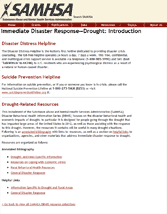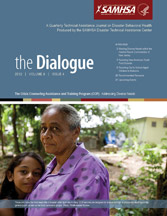Immediate Disaster Response—Hurricane Isaac: Introduction
|
This installment of the Substance Abuse and Mental Health Services Administration (SAMHSA) Disaster Behavioral Health Information Series (DBHIS) focuses on first responders and, currently, Hurricane Isaac. Following is an annotated bibliography with links to helpful resources, as well as a section on helpful links to organizations, agencies, and other materials that address immediate disaster response. Resources are organized as follows:
Disaster Distress Helpline National Suicide Prevention Lifeline For resources addressing children, youth, and disasters, please visit the SAMHSA Children and Youth DBHIS. |
DTAC Quick Links
- FacebookExternal link. Please review our Disclaimer
- FlickrExternal link. Please review our Disclaimer
- RSS FeedsExternal link. Please review our Disclaimer
- SAMHSA BlogExternal link. Please review our Disclaimer
- TwitterExternal link. Please review our Disclaimer
- YoutubeExternal link. Please review our Disclaimer
Immediate Disaster Response: Drought-Disaster Behavioral Health Information Series (DBHIS)
This Substance Abuse and Mental Health Services Administration (SAMHSA) DBHIS installment focuses on the disaster behavioral health and economic impacts of drought. In particular it is designed for people going through the drought that has impacted large areas of the United States in 2012, as well as those assisting with the response to this drought.
The Dialogue Volume 8: Issue 4
In this issue of The Dialogue, we have asked current Crisis Counseling Assistance and Training Program (CCP) staff to share their experiences from recent disasters. Each brought a different perspective and highlighted how his or her team had adapted their CCP to meet the needs of a particular community. We appreciate their efforts to do so in the midst of disaster response and hope that you find their articles informative as well as inspiring.





